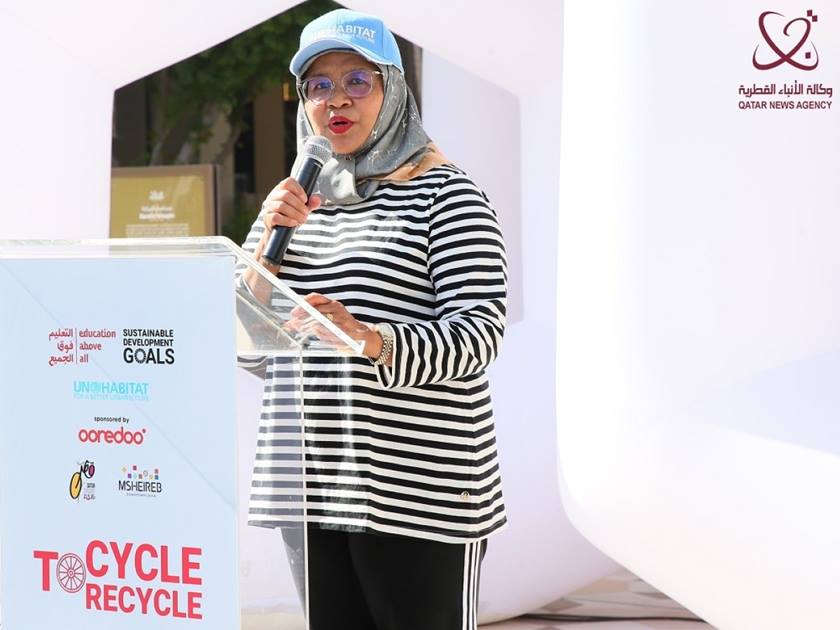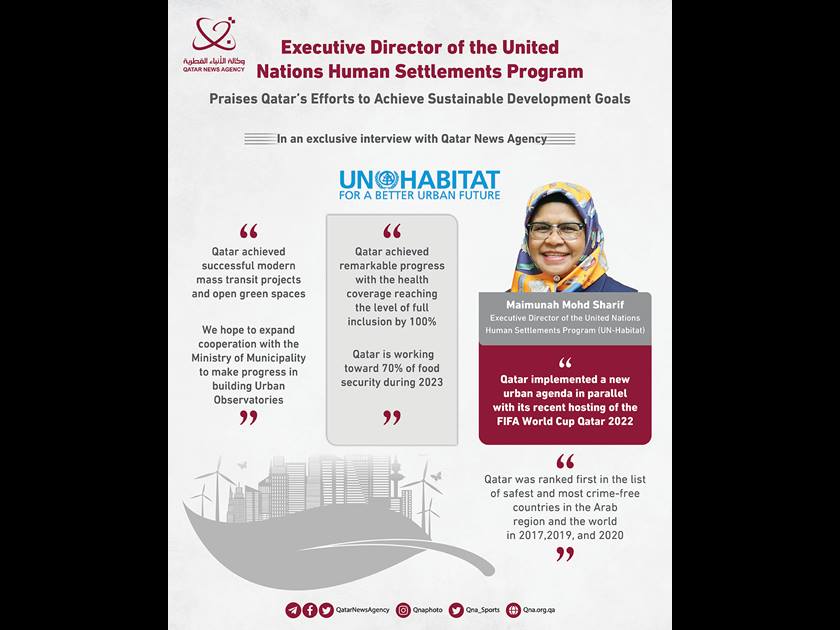Doha, January 15 (QNA) - The Executive Director of the United Nations Human Settlements Program (UN-Habitat) Maimunah Mohd Sharif praised the State of Qatar's efforts in achieving the Sustainable Development Goals (SDG), especially in implementing a new urban agenda in parallel with its recent hosting of the FIFA World Cup Qatar 2022.
In an exclusive interview with Qatar News Agency (QNA), the Executive Director of the United Nations Human Settlements Program (UN-Habitat) said that she was briefed on the achievements and urban development projects, such as modern mass transit projects, open green spaces, and urban services that constitute significant progress toward achieving the indicators of goal eleven of the SDG.
She noted the achieved progress in the field of preventive and psychological care in various sectors, including the early detection of disease and the health coverage reaching the level of full inclusion by 100%, which is considered a remarkable progress. She pointed out that Qatar is working toward 70% of food security during 2023 as Qatar National Vision 2030 adopted the promotion of the SDG. It is worth noting that Qatar was ranked first in the list of safest and most crime-free countries in the Arab region and the world in 2017,2019, and 2020, which constitutes a major progress.
She believes that with the rapid urbanization in Qatar, there is a room for cooperation where the UN-Habitat can support local authorities and stakeholders in their efforts to implement the SDGs and the New Urban Agenda, as well as promote sustainable and inclusive urban development. She said that UN-Habitat hopes to expand cooperation with the Ministry of Municipality to make progress in building Urban Observatories to support urban data and evidence-based policymaking.
Regarding the United Nations Human Settlements Program view of the achieved SDGs in the Arab world, Maimunah Mohd Sharif stressed that there are positive indicators and setbacks around the region, not only regarding goal eleven but the whole SDGs. Many countries are on the right track to achieving goal four (Quality Education), goal seven (Affordable and Clean Energy), and goal thirteen (Climate Action), while other countries showed moderate performance increases across many of the other SDGs.
She believes that several Arab countries have taken measures to empower local administrations, especially in implementing the New Urban Agenda. Countries like Algeria, Tunisia, and Palestine have adopted measures to move towards decentralization and build the capabilities of local authorities, while Egypt has developed a central coordination mechanism that focuses on bridging the gap between different regions.
In this regard, she indicated that a number of Arab countries monitor the implementation of the SDGs at the local level through Voluntary Local Reviews (VLRs). The first VLRs in the Arab region was launched in Amman, Jordan, and more cities like Agadir, Morocco; Ramallah, Palestine; and Tunis, Tunisia are working on developing their VLRs. According to the 2022 SDG index, and the rates related to the Arab region, most countries in the region show a decline or stagnation in goal eleven (Sustainable Cities and Communities), which can be explained by the conflicts experienced by low-income countries in the region and populations affected by conflicts and natural disasters.
She said that countries of the Arab region were repeatedly described as hotspots of future climate change negative effects. Many of these climate change effects have begun to emerge, such as droughts, floods, and extreme heat. These effects are just a few of many examples as they exacerbate the existing social, economic, and environmental vulnerabilities, acting as drivers of resource insecurity and displacement in vulnerable countries and those affected by conflicts.
She said that the region is already home to twelve of the world's most water-scarce countries and has some of the highest levels of dependence on food imports. Despite all that, the Arab region still has a great opportunity to accelerate the implementation of goal eleven and the other SDGs through the ability to access technology, innovation, and environmental awareness for the youth segment that reaches 60% (under 25 of age), in addition to the initiatives of sustainable urban development and clean energy investments, which are seen as major catalysts for accelerating the 2030 Agenda.
Improving urban governance, land and property management, sustainable management of natural resources, and access to affordable housing are also seen as priorities to accelerate the progress toward achieving goal eleven of the SDGs in the Arab region.
At the global level, the Executive Director of the UN-Habitat highlighted the need for further efforts to make significant progress in achieving the goals of 2030, with more than half of the world's population living in cities, and by 2050, it is likely that seven in 10 people will live in urban areas, given that cities are the engines of economic growth and contribute to more than 80 percent of global GDP. However, cities are also responsible for more than 70 percent of global greenhouse gas emissions, she said.
The world needs to do more to improve air quality, create public and car-free spaces in cities, and reduce the population in slums, with a billion people living in slums, she said, highlighting empirical analyses that show that a 2.3 percent increase is expected in the number of slums worldwide and a 5.3 percent increase in Africa and Asia, due to a one percent increase in urban population growth, given that more than 70 percent of the population will live in urban areas.
Sharif underscored the importance of local waste collection and management services in the permanently growing cities, pointing out that 82 percent of solid waste was collected globally in 2022, and 55 percent of waste was managed in controlled facilities. She called for further attention to sub-Saharan Africa and Oceania, with the average collection rate for municipalities there being less than 60 percent.
Commenting on the global achievement related to the UN sustainable development goals, especially Goal 11, which is directly linked to the UN Human Settlements Program, she said the world is seven years from 2030, the year when the goals of sustainable development are required to be achieved. She added that the UN Human Settlements Program, a UN organization responsible for urbanization and sustainable cities, is keen to follow up on the implementation of Goal 11, to achieve sustainable cities and communities, highlighting the progress and regression witnessed in the indicators of Goal 11, as well as the indicators which implementation is closely related to urban areas in general.
Sharif highlighted the improvement in air quality and urban strategies, with a record number of 6,000 cities in 117 countries, monitoring air quality now, and many other adopting national urban policies and strategies for disaster risk reduction. Between 2015 and 2021, the number of countries with local disaster response strategies almost doubled from 51 to 98, and today there are 162 countries with national urban policies, she said.
However, the progress in national urban policies declined over Covid-19 pandemic, with the pandemic exposing the fragility of urban systems, downplaying the decades-long progress in health care, education and combating poverty. 'The World Cities Report 2022: Envisaging the Future of Cities' by the UN-Habitat, found that the pandemic created nearly 163 million new poor people in 2021, and that one billion people living in slums, mostly in Africa and Asia, including nearly 10 percent within the Arab region.
Highlighting the impacts of disasters, economic losses on people and infrastructure, Sharif said that the Emergency Events Database, in 2021, recorded 432 natural disasters that affected 101.8 million people and caused economic losses estimated at $US 252.1 billion. All of these crises are linked to the climate crisis and the ongoing conflicts affecting many vulnerable groups of the population, so further resources are needed to direct them to adapt to climate change and mitigate its impacts at the local level, she added.
The UN-Habitat has 14 offices in nearly 90 countries worldwide, most notably in the Middle East and North Africa, Sharif said, pointing out that it works on implementing urban development projects in general through technical tools and solutions for issues of urban planning, housing and basic services such as water, sanitation, transportation, smart cities, municipal administration, as well as humanitarian projects related to conflict areas, including inputs for rehabilitation and reconstruction of infrastructure, public spaces, housing, and finding solutions to disputed property issues.
She highlighted one of the UN-Habitat's important projects totaling more than USD 20 million to restore the urban recovery of Beirut in response of the blast that hit the city in August 2020. She also highlighted the EUR 25 million 'Go Blue' initiative, that aims to conserve coastal and marine environments to achieve the sustainable blue economy agenda in six Kenyan coastal regions. (QNA)



